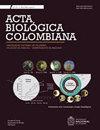ARBUSCULAR MYCORRHIZA SYMBIOSIS REDUCES THE RHIZOCTONIA ROOT ROT AND ALTERS THE PHENOLIC PROFILE IN COMMON BEAN
IF 0.5
4区 生物学
Q4 PLANT SCIENCES
引用次数: 0
Abstract
Arbuscular mycorrhizal fungi (AMF) have the potential to reduce the deleterious effect of soil-borne pathogens, but their ability for pathogen biocontrol may vary depending on the genotype of the plant, the pathogen, and the AMF interaction. Thus, the aim of this work was to evaluate the effect of the Mexican biofertilizer Rizofermic-UV based on a mix of AMF formulation against the common bean root rot caused by the pathogenic fungus Rhizoctonia solani Kühn 1858 (Teleomorph: Thanatephorus cucumeris). Additionally, the total phenolic content, individual phenolic acid (caffeic, ferulic, o-cumaric, p-cumaric, sinapic, and vanillic), and the flavonoid (catechin, kaempferol, quercetin and, rutin) profiles were analyzed. Our results show that the AMF biofertilization reduces the disease severity up to 68 %, and this was accompanied by a boost in total phenolic content in dual inoculation. Furthermore, a variation in the individual phenolic profiles caused by both AMF interaction and pathogen treatment alone were observed. In dual inoculations, vanillic acid was significantly different among treatments, suggesting it may contribute to the enhanced resistance of mycorrhizal roots to soil-borne pathogens. Further work is required to elucidate the exact role of these compounds in the bioprotection of arbuscular mycorrhizal to plant pathogens.丛枝菌根共生减少了根核菌性根腐病,改变了普通豆的酚类分布
丛枝菌根真菌(AMF)有可能减少土传病原体的有害影响,但其病原体生物控制能力可能因植物基因型、病原体和AMF相互作用而异。因此,本工作的目的是评估基于AMF制剂混合物的墨西哥生物肥料Rizofermic UV对由病原真菌立根菌Kühn 1858(Teleomorph:Thanatephorus cucumeris)引起的普通豆根腐病的效果。此外,还分析了总酚含量、单个酚酸(咖啡酸、阿魏酸、邻枯酸、对枯酸、芥子酸和香兰素)和类黄酮(儿茶素、山奈酚、槲皮素和芦丁)的图谱。我们的研究结果表明,AMF生物肥料将疾病的严重程度降低了68%,同时在双重接种中提高了总酚含量。此外,观察到由AMF相互作用和单独病原体处理引起的个体酚谱的变化。在双重接种中,不同处理之间的香草酸差异显著,这表明香草酸可能有助于增强菌根根对土传病原体的抗性。需要进一步的工作来阐明这些化合物在丛枝菌根对植物病原体的生物保护中的确切作用。
本文章由计算机程序翻译,如有差异,请以英文原文为准。
求助全文
约1分钟内获得全文
求助全文
来源期刊

Acta Biologica Colombiana
Agricultural and Biological Sciences-General Agricultural and Biological Sciences
CiteScore
1.60
自引率
0.00%
发文量
21
审稿时长
13 weeks
期刊介绍:
The journal is published quarterly and divulges original and unpublished results of basic and applied research about biological subjects with special interest in Neotropical region. Manuscripts may be research articles, reviews, reflection articles or short notes. The Acta biol. Colomb Journal have a scientific and editorial board composed of expert researchers of in their areas of knowledge.
 求助内容:
求助内容: 应助结果提醒方式:
应助结果提醒方式:


